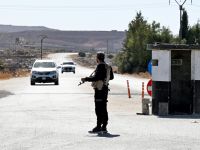Syria's President Bashar al-Assad made an historic visit to Beirut Sunday (March 3rd).
His stopover in the Lebanese capital sparked a wide range of reactions from across the Lebanese political spectrum, with many officials reasserting the need to rectify bilateral ties between the two neighboring countries.
Former army commander General Michel Aoun said that the meeting was aimed at “outbidding and aborting” the land-for-peace initiative recently floated by Saudi Crown Prince Abdullah.
In an interview with from Paris, Aoun commented on both the economic and political aspects of the meeting, saying that it had contributed to the sabotage of both Abdullah’s proposal and the upcoming Arab summit in Beirut scheduled to take place at the end of this month.
“On the economic level, the visit is meaningless, especially in light of the weight of the economic crisis,” he expressed. Aoun stated that Syrian economic proposals made during the meeting “will not solve the crisis,” adding, “any initiative which ties the Lebanese economy to the Syrian one will further aggravate an already-sinking economy.”
Nevertheless, also commenting on the Syrian President’s economic proposals was Parliament Member Batroun Butros Harb, who described the visit as “positive”. He explained it had positive repercussions for bilateral political relations. He cited the fact that the Higher Lebanese-Syrian Council had met for the first time in Syria, and lent cautious approval to Damascus’ proposition to waive half of Lebanon’s electricity debts.
“We need to find out the reasons behind the plan and the motives before judging them,” he said, assuring however, that “bilateral relations seemed to be moving on the right track.”
However, Harb, a member of the Qornet Shehwan opposition grouping, also pleaded for more transparency from the council, and criticized the fact that it does not answer to the government.
According to Lebanon’s Daily Star, Harb believed that the fact that al-Assad outpaced the Arab summit was “a good thing” provided that Sunday’s visit did not come in lieu of the Syrian leader’s participation in March 27-28, which he said needed the maximum amount of Arab support.
Meanwhile, former President Amin Gemayel claimed it was too early to comment on the visit’s repercussions. However, he expressed his hope that the visit could result in the re-evaluation of “disturbed” bilateral relations, “which according to most Lebanese figures of authority were imbalanced and unfair.”
“I hope (Presidents Assad and Emile Lahoud) arrived at the inevitable conclusion that the time has come to rectify those relations,” he conveyed.
In addition, independent opposition figure and former Speaker Hussein Husseini expressed “deep satisfaction” with the visit, especially in wake of the delicate regional situation. He said, however, that the Higher Council’s meeting should be held on a more regular basis.
Also commenting on the visit was former Parliament Member Habib Sadeq, who heads the Democratic Forum opposition group. He remarked that “every move that might strengthen Arab unity and serve the Arab cause should take place.”
Sadeq stressed that Lebanon and Syria were united throughout history, but that the time was right for local officials to gather up enough courage to discuss the rectification of bilateral relations with the Syrians.
Meanwhile, American University of Beirut Professor Farid Khazen, another Qornet Shehwan member, said that the visit did not have any political significance, “It’s simply of symbolic importance.”
“Relations with Lebanon are … formulated through unofficial channels,” he added, citing the fact that the Higher Lebanese-Syrian Council, which is supposed to meet annually, has only met four times since it was created 11 years ago.
Khazen dismissed media commentaries of the visit as “landmark,” maintaining that “a landmark visit would last more than six hours and would be announced ahead of time.” Furthermore, he said the visit did not include a declared political agenda. (Albawaba.com)
© 2002 Al Bawaba (www.albawaba.com)







